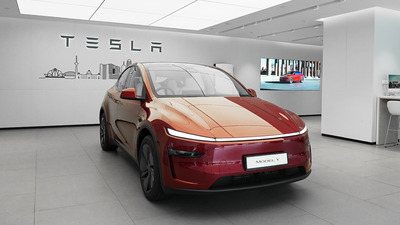China is planning to ban 'design feature' that has been the 'hallmark' of Tesla cars since many years
China’s Ministry of Industry and Information Technology has reportedly unveiled a draft national standard that could spell the end for hidden door handles, a popular feature in new energy vehicles (NEVs) and some gasoline models, citing safety concerns. According to a report in South China Post, the proposed regulation, released this week, mandates that all passenger car doors, except tailgates, must have exterior handles with a minimum hand-operable space of 60mm x 20mm x 25mm and a mechanical release function.

The proposal, if implemented, will effectively ban fully flush, electronically actuated door handles — a design Tesla helped popularize and that has since become a hallmark of NEVs. These handles sit flush with the body and extend only when activated. They were designed to cut air drag to extend NEVs' mileage and also give cars a futuristic look.
Xiaomi SUV crash raised fears
The move aims to enhance vehicle safety, improve passive safety technologies, and protect lives, the ministry stated. Hidden door handles have raised concerns about emergency access. Reports, including an incident involving a Xiaomi SU7, highlight difficulties rescuers face in opening doors during accidents, particularly if sensors fail or power is lost.
“Hidden handles can jam in collisions or fires, complicating rescues,” an engineer from a domestic carmaker told National Business Daily. Great Wall Motor Chairman Wei Jianjun has also criticized the design’s reliability. Public data shows about 60% of China’s top 100 NEVs in April featured these handles, seen in models like the Nio ES8, Li Auto i8, Xiaomi YU7, and XPeng P7.The draft requires doors to be openable without tools, even if the vehicle’s locking system or battery fails. While hidden handles improve range by 5-10 kilometers, according to an Aion engineer, their futuristic appeal may not outweigh safety risks. Some buyers, particularly older consumers, prefer conventional handles, dealers note.
Automakers are bracing for costly redesigns but are ready to comply. Toyota is developing mechanical backups for hidden handles, while Geely, involved in drafting the standard, and Leapmotor have pledged adherence. The proposal includes a transition period: new models must comply within seven months of adoption, and existing models within 19 months.
The Chinese ministry is seeking public feedback before finalizing the rule, which analysts say balances urgent safety needs with automakers’ development timelines. If implemented, the standard could reshape vehicle design in China’s booming NEV market, prioritizing safety over style.
The proposal, if implemented, will effectively ban fully flush, electronically actuated door handles — a design Tesla helped popularize and that has since become a hallmark of NEVs. These handles sit flush with the body and extend only when activated. They were designed to cut air drag to extend NEVs' mileage and also give cars a futuristic look.
Xiaomi SUV crash raised fears
“Hidden handles can jam in collisions or fires, complicating rescues,” an engineer from a domestic carmaker told National Business Daily. Great Wall Motor Chairman Wei Jianjun has also criticized the design’s reliability. Public data shows about 60% of China’s top 100 NEVs in April featured these handles, seen in models like the Nio ES8, Li Auto i8, Xiaomi YU7, and XPeng P7.The draft requires doors to be openable without tools, even if the vehicle’s locking system or battery fails. While hidden handles improve range by 5-10 kilometers, according to an Aion engineer, their futuristic appeal may not outweigh safety risks. Some buyers, particularly older consumers, prefer conventional handles, dealers note.
Automakers are bracing for costly redesigns but are ready to comply. Toyota is developing mechanical backups for hidden handles, while Geely, involved in drafting the standard, and Leapmotor have pledged adherence. The proposal includes a transition period: new models must comply within seven months of adoption, and existing models within 19 months.
The Chinese ministry is seeking public feedback before finalizing the rule, which analysts say balances urgent safety needs with automakers’ development timelines. If implemented, the standard could reshape vehicle design in China’s booming NEV market, prioritizing safety over style.
Next Story